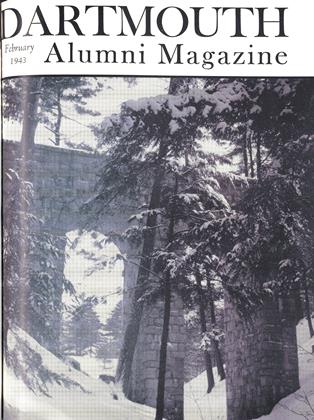CONTINUATION OF DARTMOUTH'S 172-year-old liberal arts program, no matter how small its non-military enrollment becomes, was pledged by President Hopkins in a statement prefacing a war bulletin on new Army-Navy college training plans sent to all undergraduates during the Christmas recess.
"Despite the necessary preponderance for the time being of the war effort within its halls," President Hopkins stated, "Dartmouth will still retain the organization and offer the curriculum of the liberal college for those by whom such preparation for living in the post-war world can be undertaken. This policy was defined by the Trustees early in their consideration of the war program and remains their policy as positively today as ever."
At the same time he reiterated the College's willingness to meet the war needs of the government. "From the enrolling of the first class in 1770, before the organization of the national government, until now," he said, "Dartmouth in all wars has made every possible contribution to the government's need, and has never closed its doors in any war. Now again in this great world crisis, its plant, its facilities, its organization, and its personnel will be made available as these may be needed by the government."
Supplementing this formal statement in the war bulletin, President Hopkins at the same time asserted that there was less danger to the liberal college from temporary war adversity than from the attitude of some educators that the undergraduate course should be telescoped to two years and should be considered worthwhile only as preparing men for graduate or professional studies. This view wholly disregards the interests of fifty per cent of the student body of a liberal arts college such as Dartmouth, he said, and added that the maintenance of the normal curriculum amidst necessary war training is far more important than any financial loss that might be involved.
 View Full Issue
View Full Issue
More From This Issue
-
 Article
ArticleSulzberger Addresses 1943
February 1943 -
 Article
Article'Round the Girdled Earth
February 1943 By Herbert F. West '22. -
 Article
ArticleColleges Will be Used for Military Training
February 1943 By LLOYD K. NEIDLINGER '23 -
 Article
ArticleGovernment War Work
February 1943 -
 Class Notes
Class Notes1939
February 1943 By RICHARD S. JACKSON -
 Class Notes
Class Notes1929
February 1943 By F. WILLIAM ANDRES
Article
-
 Article
ArticleMEMBERS OF 1924 RECEIVING SCHOLARSHIP HONORS
August 1924 -
 Article
ArticleInvestigate Publications
November 1937 -
 Article
ArticleTrack
June 1958 By CLIFF JORDAN '45 -
 Article
ArticleThe Irish and Other Problems
MAY 1982 By Frank C. Newman '38 -
 Article
ArticleOrlando-Winter Park
JUNE 1970 By KENNETH H. THOMAS '21 -
 Article
ArticlePromising Changes
June 1941 By The Editor

